Howard S. Becker
Howard S. Becker
Philippa J. Benson and Susan C. Silver
Bryan A. Garner
Bryan A. Garner
Anne E. Greene
Jane E. Miller
Jane E. Miller
Kate L. Turabian
Kate L. Turabian
The Craft of Research
Fourth Edition
Wayne C. Booth
Gregory G. Colomb
Joseph M. Williams
Joseph Bizup
William T. FitzGerald
The University of Chicago Press
Chicago & London
Wayne C. Booth (19212005) was the George M. Pullman Distinguished Service Professor Emeritus in English Language and Literature at the University of Chicago. His books included The Rhetoric of Fiction and For the Love of It: Amateuring and Its Rivals, both published by the University of Chicago Press.
Gregory G. Colomb (19512011) was professor of English at the University of Virginia and the author of Designs on Truth: The Poetics of the Augustan Mock-Epic.
Joseph M. Williams (19332008) was professor in the Department of English Language and Literature at the University of Chicago and the author of Style: Toward Clarity and Grace.
Joseph Bizup is associate professor in the Department of English at Boston University as well as assistant dean and director of the College of Arts and Sciences Writing Program. He is the author of Manufacturing Culture: Vindications of Early Victorian Industry.
William T. FitzGerald is associate professor in the Department of English at Rutgers University. He is the author of Spiritual Modalities: Prayer as Rhetoric and Performance.
The University of Chicago Press, Chicago 60637
The University of Chicago Press, Ltd., London
1995, 2003, 2008, 2016 by The University of Chicago
All rights reserved. Published 2016.
Printed in the United States of America
25 24 23 22 21 20 19 18 17 16 1 2 3 4 5
ISBN-13: 978-0-226-23956-9 (cloth)
ISBN-13: 978-0-226-23973-6 (paper)
ISBN-13: 978-0-226-23987-3 (e-book)
DOI: 10.7208/chicago/9780226239873.001.0001
Library of Congress Cataloging-in-Publication Data
Names: Booth, Wayne C., author. | Colomb, Gregory G., author. | Williams, Joseph M., author. | Bizup, Joseph, 1966 author. | FitzGerald, William T., author.
Title: The craft of research / Wayne C. Booth, Gregory G. Colomb, Joseph M. Williams, Joseph Bizup, William T. FitzGerald.
Other titles: Chicago guides to writing, editing, and publishing.
Description: Fourth edition. | Chicago: The University of Chicago Press, 2016. | Series: Chicago guides to writing, editing, and publishing | Includes bibliographical references and index.
Identifiers: LCCN 2016000143 | ISBN 9780226239569 (cloth: alk. paper) | ISBN 9780226239736 (pbk.: alk. paper) | ISBN 9780226239873 (e-book)
Subjects: LCSH: ResearchMethodology. | Technical writing.
Classification: LCC Q180.55.M4 B66 2016 | DDC 001.4/2dc23 LC record available at http://lccn.loc.gov/2016000143
 This paper meets the requirements of ANSI/NISO Z39.48-1992 (Permanence of Paper).
This paper meets the requirements of ANSI/NISO Z39.48-1992 (Permanence of Paper).
Contents
The Aims of This Edition
This fourth edition of The Craft of Research is the first to appear since the deaths of the books three original authors, Wayne C. Booth, Gregory G. Colomb, and Joseph M. Williams. In undertaking this revision, weJoseph Bizup and William T. FitzGeraldfaced the pleasurable and challenging task of reworking a book we have both long admired. Our goal has been to update and refine it without appropriating it from its original authors.
The fourth edition has the same main aim as the first three: to meet the needs of all researchers, not just first-year undergraduates and advanced graduate students, but even those in business and government who do and report research on any topic, academic, political, or commercial. The book was written to
guide you through the complexities of turning a topic or question into a research problem whose significance matches the effort that you put into solving it;
help you organize and draft a report that justifies the effort;
show you how to read your report as your readers will so that you can revise it into one that they will read with the understanding and respect it deserves.
Other handbooks touch on these matters, but this one is different. Most current guides acknowledge that researchers rarely move in a straight line from finding a topic to stating a thesis to filling in note cards to drafting and revision. Experienced researchers loop back and forth, move forward a step or two before going back in order to move ahead again, change directions, all the while anticipating stages not yet begun. But so far as we know, no other guide tries to explain how each part of the process influences all the othershow developing a project prepares the researcher for drafting, how drafting can reveal problems in an argument, how writing an introduction can prompt you to do more research.
In particular, the book tries to be explicit about matters that other guides treat as a mysterious creative process beyond analysis and explanation, including
how to turn a vague interest into a problem readers think is worth posing and solving;
how to build an argument that motivates readers to take your claim seriously;
how to anticipate the reservations of thoughtful but critical readers and then respond appropriately;
how to create an introduction and conclusion answering that toughest of questions from readers, So what?;
how to read your own writing as readers will, and thereby know when and how to revise it.
Central in every chapter is the advice to side with your readers, to imagine how they will judge what you have written.
The book addresses the formal elements common to most genres of research-based writing not just because writers need to understand their superficial shape but also because they help writers think. These genresthe research paper, the research report, the white paper, and many othersare not empty patterns or forms: they also embody and enable specific ways of working and arguing; they help us all to develop and refine our projects, test our work, and even discover new lines of thought. How we write thus affects how we argue and research, and vice versa. In this sense, to learn the genres of ones field is to learn the field itself.
The book is informed by another conviction as well: that the skills of research and research-based writing are not just for the elite but can be learned by everyone. Some aspects of advanced research can be learned only in the context of a specific community of researchers, but even if you dont yet belong to one, you can still create something like it on your own. Our Postscript for Teachers suggests ways you (and your teachers) can do that.

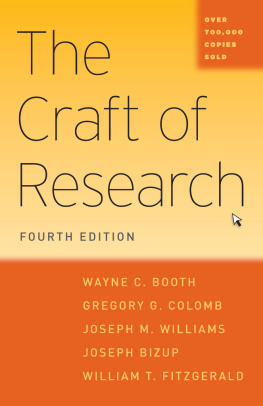
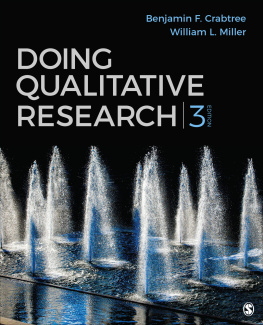
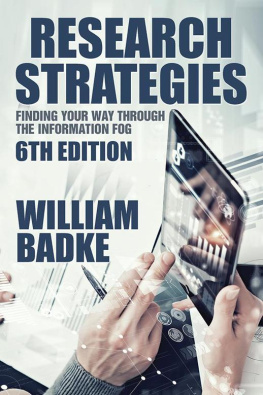

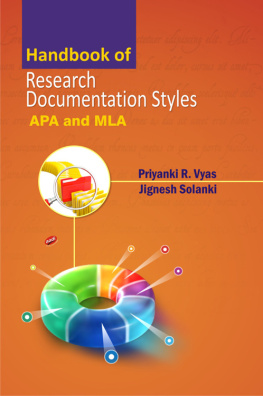
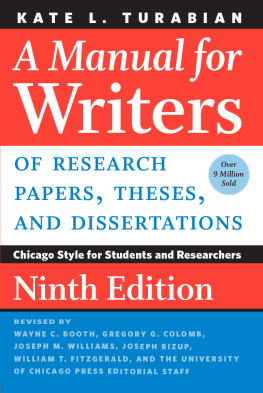

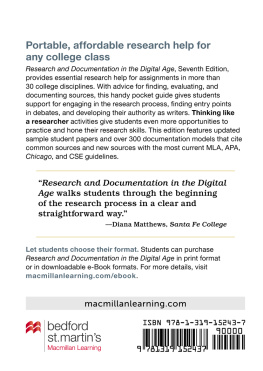
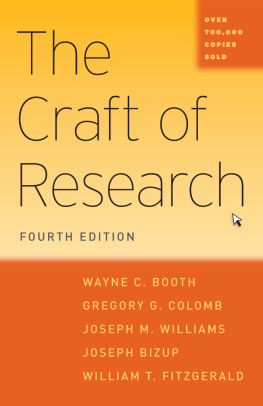
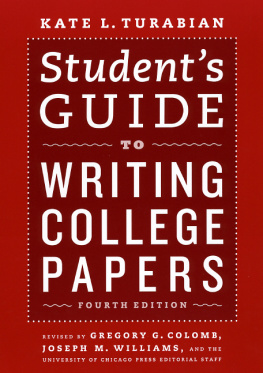
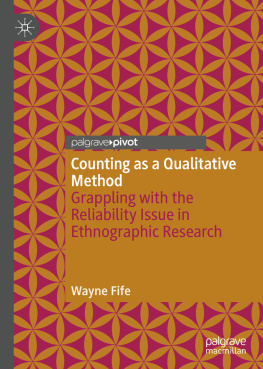
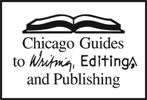
 This paper meets the requirements of ANSI/NISO Z39.48-1992 (Permanence of Paper).
This paper meets the requirements of ANSI/NISO Z39.48-1992 (Permanence of Paper).